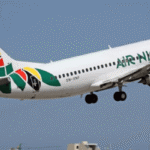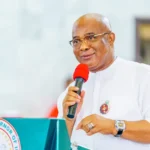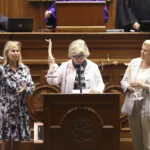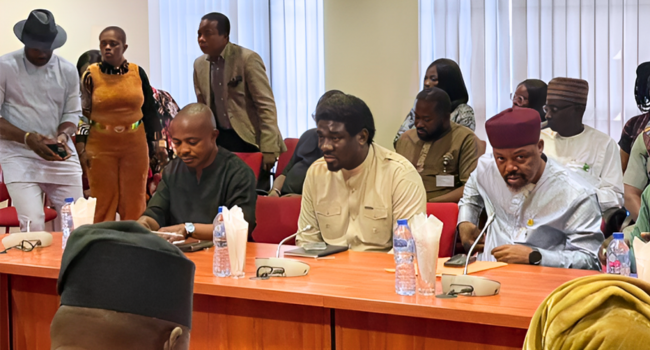The Organised Labour said the one-week grace period given to the Federal Government last Tuesday, June 4, 2024, would expire by the midnight of Tuesday, June 11, 2024.
Labour said should the Federal Government and National Assembly fail to act on the demands of workers by tomorrow (Tuesday), the organs of the Nigeria Labour Congress (NLC) and the Trade Union Congress (TUC) would meet to decide on the resumption of the nationwide industrial action relaxed last week.
Chris Onyeka, an Assistant General Secretary of the NLC, stated this on Channels Television’s The Morning Brief show on Monday.
The NLC Official said, “The Federal Government and the National Assembly have the call now. It is not our call. Our demand is there for them (the government) to look at and send an Executive Bill to the National Assembly, and for the National Assembly to look at what we have demanded, the various fact of the law, and then come up with a National Minimum Act that meets our demands.
“If that does not meet our demand, we have given the Federal Government a one-week notice to look at the issues and that one week expires tomorrow (Tuesday). If after tomorrow, we have not seen any tangible response from the government, the organs of the Organised Labour will meet to decide on what next.”
When asked what the decision of Labour would be should the government insists on ₦62,000, he said, “It was clear what we said. We said we are relaxing a nationwide indefinite strike. It’s like putting a pause on it. So, if you put a pause on something and that organs that govern us as trade unions decide that we should remove that pause, it means that we go back to what was in existence before.”
He said Labour won’t accept any ₦62,000 or ₦100,000 “starvation wage” as the minimum wage for Nigerian workers.
He insisted on ₦250,000, labour’s latest demand at the last meeting of the Tripartite Committee on Minimum Wage on Friday, as the living wage for an average Nigerian worker.
He said labour won’t accept the latest government’s offer of ₦62,000 and the ₦100,000 proposal by some individuals and economists.
Onyeka said, “We have never considered accepting ₦62,000 or any other wage that we know is below what we know is able to take Nigerian workers home. We will not negotiate a starvation wage.
“We have never contemplated ₦100,000 let alone of ₦62,000. We are still at ₦250,000, that is where we are, and that is what we considered enough concession to the government and the other social partners in this particular situation. We are not just driven by frivolities but the realities of the market place; realities of things we buy every day: bag of rice, yam, garri, and all of that.”
After weeks of failed talks on a new minimum wage for workers in the country, Labour declared an indefinite industrial action on Monday, June 3, 2024. Businesses were paralysed as labour shut down airports, hospitals, national grid, banks, National Assembly and state assemblies’ complexes.
The labour unions said the current minimum wage of ₦30,000 can no longer cater to the wellbeing of an average Nigerian worker, saying government should offer workers something economically realistic in tandem with current inflationary pressures, attendant effects of the twin policies of petrol subsidy removal and unification of the forex windows of the current administration.
The labour unions also lamented that not all governors are paying the current wage award which expired in April 2024, five years after the Minimum Wage Act of 2019 was signed by former President Muhammadu Buhari. The Act should be reviewed every five years to meet up with contemporary economic demands of workers.
In January 2024, President Bola Tinubu inaugurated a tripartite committee to negotiate a new minimum wage for the country.
At the start of negotiations, Labour presented ₦615,000 as the new minimum wage but saw reasons to drop their demand to ₦497,000, and then to ₦494,000.
Also, in the beginning, the government and the Organised Private Sector proposed ₦48,000, ₦54,000, ₦57,000, and later ₦60,000, all four offers were rejected by Labour, prompting the strike.
In the heat of the impasse and the attendant consequences of the strike last Monday, June 3, 2024, the Secretary to the Government of the Federation (SGF), George Akume, said the President was committed to a wage above ₦60,000, and that the government side of the tripartite committee would meet with labour for one week to agree on a wage.
Persuaded, labour “relaxed” its industrial action on Tuesday, June 4, 2024, some 24 hours after the strike. Both TUC and NLC leadership subsequently resumed talks with the representatives of the Federal Government, states, Organised Private Sector.
The President also directed Minister of Finance, Wale Edun, to present a template for a new minimum wage. Before the directive, the minister described as “unaffordable, the demands of labour. Also, the 36 state governors said labour’s demands was not sustainable.
However, on Friday, June 7, 2024, the two sides (labour and the government) failed to reach an agreement. While labour dropped again its demand from ₦494,000 to ₦250,000, the government added ₦2,000 to its initial ₦60,000 and offered workers ₦62,000.
Both sides submitted their reports to the President who is expected to make a decision and send an executive bill to the National Assembly to pass a new minimum wage bill to be signed into law by the President.




















































































